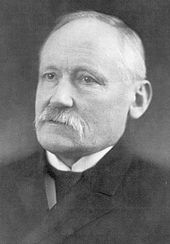J.J.M. de Groot | |||||||||
|---|---|---|---|---|---|---|---|---|---|
 | |||||||||
| Born | 18 February 1854 | ||||||||
| Died | 24 September 1921 (aged 67) | ||||||||
| Nationality | Dutch | ||||||||
| Scientific career | |||||||||
| Fields | Chinese history, religion | ||||||||
| Institutions | Leiden University | ||||||||
| Academic advisors | Gustaaf Schlegel | ||||||||
| Notable students | J.J.L. Duyvendak | ||||||||
| Chinese name | |||||||||
| Chinese | 高延 | ||||||||
| |||||||||
Jan Jakob Maria de Groot (18 February 1854 – 24 September 1921) was a Dutch sinologist and historian of religion. He taught at the Leiden University and later at the University of Berlin, and is chiefly remembered for his monumental work, The Religious System of China, Its Ancient Forms, Evolution, History and Present Aspect, Manners, Customs and Social Institutions Connected Therewith. The two "books" of this detailed and well-illustrated treatise appeared in six volumes - and, according to the preface in the first volume, the System was originally meant to include several more "books".
De Groot became a corresponding member of the Royal Netherlands Academy of Arts and Sciences in 1887, a foreign member in 1892 and a regular member in 1911.[1]

- ^ "J.J.M. de Groot (1854 - 1921)". Royal Netherlands Academy of Arts and Sciences. Retrieved 24 January 2016.